
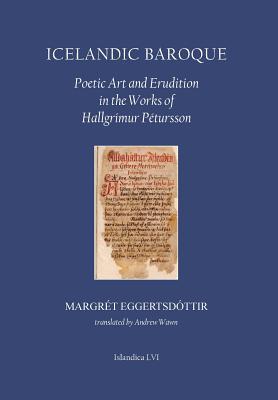
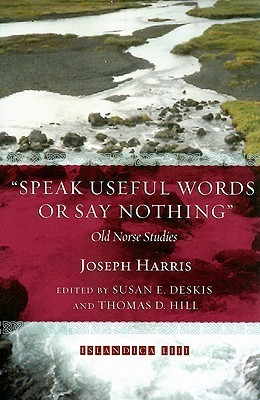
Islandica
Series · 9 books · 1932-2021
Books in series

#1
The Structure of Old Norse Dróttkvætt Poetry
1995
The drottkvett was a form of Old Norse skaldic poetry composed to glorify a chieftain's deeds or to lament his death. Kari Ellen Gade explores the structural peculiarities of ninth- and tenth-century drottkvett poetry and suggests a solution to the mystery of the origins of the drottkvett and its eventual demise in the fourteenth century.

#3
Icelandic Baroque
Poetic Art and Erudition in the Works of Hallgrímur Pétursson
2014
Icelandic Baroque seeks to approach the writings of Hallgrímur Pétursson (1614 – 1674), Iceland's leading devotional poet, from a new direction. Hallgrímur is best known for his Passiusalmar, fifty hymns that contemplate the crucifixion and death of Christ, using a variety of meters and melodies; they have been sung in Iceland over Lent for many generations. This book offers a new evaluation of his poetry.
First, seventeenth-century Icelandic literature in general, and Hallgrímur's works in particular, are set in the wider context of contemporary European literature, particularly from Scandinavia and Germany. Second, the influence of the poet's social milieu, both domestic and overseas, is explored. Third, Eggertsdóttir explores whether and, if so, how aesthetic and literary theories of the baroque can enrich our understanding of seventeenth-century Icelandic literature. Her principal aim is to contribute to a reevaluation of Icelandic seventeenth-century literary history by applying new interpretative perspectives to works by leading poets of the period, most notably the iconic figure of Hallgrímur Pétursson.

#4
"Speak Useful Words or Say Nothing"
Old Norse Studies
2009
This selection by Susan E. Deskis and Thomas D. Hill of twelve of Joseph Harris' most important essays underscores the range of his work from critical readings of canonical texts to philological elucidation of Old Norse and Old English literary works to discussions of larger theoretical issues such as oral theory. One of the central problems of medieval literary scholarship is the aesthetics of traditional and oral literature, and how and whether one can meaningfully discuss the literary history of an oral genre. Harris' studies of such topics as the Old Norse short narrative and of the Masterbuilder tale focus precisely on such problems and offer brilliant readings of specific texts as well as models of literary historical discourse. "Speak Useful Words or Say Nothing" also shows that Harris' work frequently bridges the divide between the Latin and Christian sources and the native vernacular traditions that together found their way into Old Norse and Old English literature.
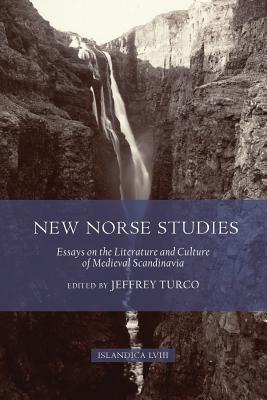
#8
New Norse Studies
Essays on the Literature and Culture of Medieval Scandinavia
2012
New Norse Studies, edited by Jeffrey Turco, gathers twelve original essays engaging aspects of Old Norse-Icelandic literature that continue to kindle the scholarly imagination in the twenty-first century. The assembled authors examine the arri�re-sc�ne of saga literature; the nexus of skaldic poetry and saga narrative; medieval and post-medieval gender roles; and other manifestations of language, time, and place as preserved in Old Norse-Icelandic texts. This volume will be welcomed not only by the specialist and by scholars in adjacent fields but also by avid general readers, drawn in ever-increasing numbers to the Icelandic sagas and their world.Contributors: Paul Acker, Saint Louis University; Gu�r�n Nordal, University of Iceland; Sarah Harlan-Haughey, Cornell University; Joseph Harris, Harvard University; Richard Harris, University of Saskatchewan; Thomas D. Hill, Cornell University; Shaun Hughes, Purdue University; Andy Orchard, University of Toronto; Russell Poole, University of Western Ontario; Torfi Tulinius, University of Iceland; Jeffrey Turco; Purdue University; Kirsten Wolf, University of Wisconsin-Madison
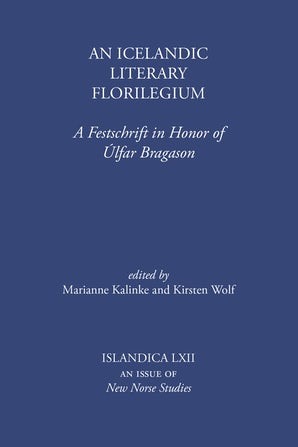
#13
An Icelandic Literary Florilegium
A Festschrift in Honor of Úlfar Bragason
2021
An Icelandic Literary Florilegium, a special issue of New Norse Studies, is a smorgasbord of noteworthy studies and brings together twelve original articles. The various authors examine topics within the field of Old Norse-Icelandic and deal with a variety of literary genres, including the Sagas of Icelanders, kings' sagas, saints' lives, contemporary sagas, skaldic poetry, and post-Reformation compositions in verse and prose. There is no unifying theme, but all articles are written with Professor Úlfar Bragason in mind. Collectively, they present a heartfelt offering to him on the occasion of his seventieth birthday in gratitude for his friendship and scholarly support through many years. This book will be welcomed not only by specialists and scholars in adjacent fields, but also by avid general readers.
Contributors: T. M. Andersson, Margaret Clunies Ross, Kate Heslop, Shaun F. D. Hughes, J�n Atli �rnason, Jon Gunnar J�rgensen, Marianne Kalinke, Annette Lassen, John Lindow, Else Mundal, Natalie M. Van Deusen, Andrew Wawn, Kirsten Wolf, Sune Wolf Pulsiano.
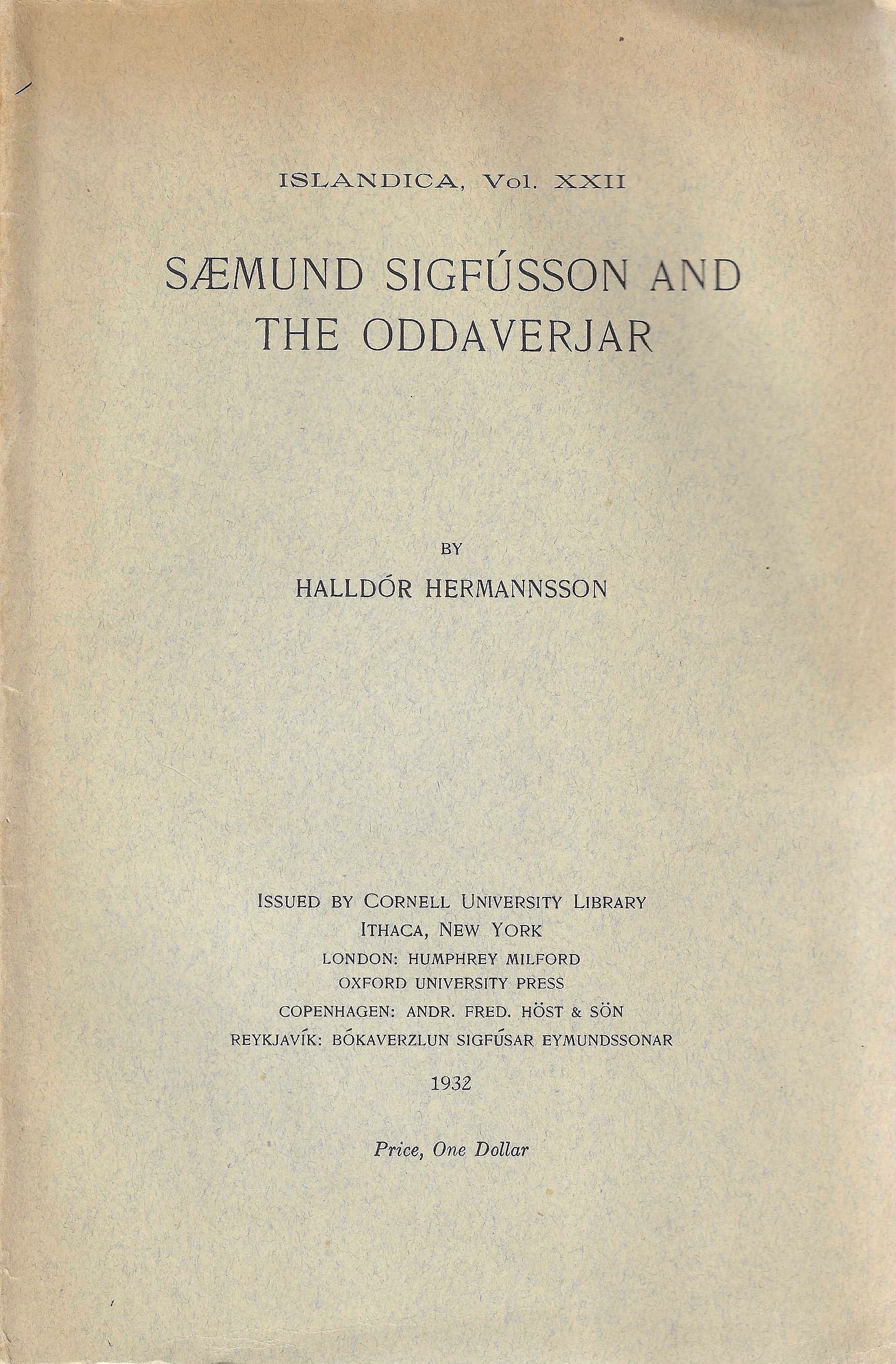
#22
Saemund Sigfússon and the Oddaverjar
1932
Halldór Hermannsson, Saemund Sigfússon and the Oddaverjar. Islandica, Vol. XXII. 1932. 52 pages and 3 plates.
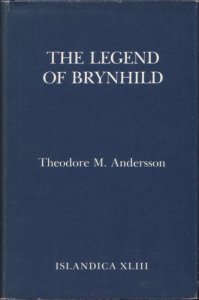
#43
The Legend of Brynhild
1980
THE definitive (English-language) book on the Volsung-Nibelung cycle of legends. This is good, solid philology not so much a critical analysis of the works but an essential volume on sources, textual transmissions, variations, and so forth. Beside the simple—but very important—fact that the story of the Volsungs and Nibelungs is one of the great tragic-heroic legends of the world, what is unique about studying this cycle is the opportunity it gives us for examining the "same" legend as it manifests itself throughout an all-but bewildering variety of versions, spread over numerous centuries and across several different geographic regions. Andersson's is a fascinating, highly detailed work.
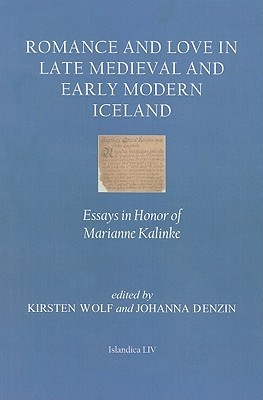
#54
Romance and Love in Late Medieval and Early Modern Iceland
Essays in Honor of Marianne Kalinke
2009
"The world of romance, whether secular or sacred, is often fraught with difficulties. Lovers are parted and have to struggle to be reunited, monsters or evil stepmothers have to be defeated, and the strength of one's devotion to God or the Virgin Mary has to be demonstrated. Scholars of medieval romance themselves often encounter a thicket of theoretical or philological thorns to wade through, but as all lovers of a good romance know, the protagonist is always rewarded for his or her kindness, wit, hard work, and perseverance."—from Romance and Love in Late Medieval and Early Modern Iceland
Marianne Kalinke, who retired from the University of Illinois at Urbana-Champaign in May 2006, made profound contributions in Old Norse-Icelandic literature over her distinguished career of teaching and writing. She is perhaps best known for her Bridal-Quest Romance in Medieval Iceland, also in the Islandica series. This volume in her honor features new essays by fourteen authors on the theme of Old Norse-Icelandic romance and love. Several chapters examine love between a man and a woman with special focus on the ways in which the Sagas of Icelanders differ from courtly romances; tragic and comic elements of Icelandic tales of love; and the differing societal roles of women and men. Other chapters explore the intersection of folklore, mythology, and romance; the role of dwarfs in fourteenth-century Icelandic romances; and the characteristics that distinguish heroic epics from romances. Aspects of love as expressed through religion are highlighted in chapters on sacred and hagiographic texts.
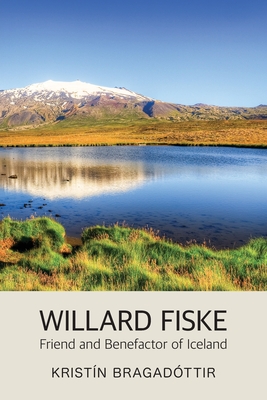
#61
Willard Fiske
Friend and Benefactor of Iceland
2019
In the middle of the nineteenth century, the young American student Daniel Willard Fiske left college to embark on a sojourn in Denmark and Sweden that would eventually lead, in 1879, to a lengthy visit to Iceland. By then, Fiske had become Cornell University's first university librarian and professor of Northern European languages, and had established the foremost book collection in private hands in America on Iceland and the medieval Norse world. Kristín Bragadóttir explores in depth Fiske's fascination with Iceland and the Icelanders, with their language and literature, describing with admiration the solicitude this remarkable American intellectual, brilliant linguist, astute bibliophile, and enthusiastic chess advocate manifested for the remote island community as it fledged from a distant Danish dependency into a nation on the path of cultural and political self-determination.
Authors
Margrét Eggertsdóttir
Author · 1 book
Works as a research professor in the Árni Magnússon Institute, i.a. on a scholarly edition of the works of Hallgrímur Pétursson.

Kari Ellen Gade
Author · 1 book
Kari Ellen Gade was Provost Professor of Germanic Studies and Adjunct Professor of English at Indiana University, Bloomington. She was the author of The Structure of Old Norse Dróttkvætt Poetry (Ithaca and London, 1995) and (with Theodore M. Andersson) Morkinskinna: The Earliest Icelandic Chronicle of the Norwegian Kings (1030-1157) (Ithaca and London, 2000). Her research interests were in Old Norse language, literature, culture and history, together with Germanic Philology and metrics. She was one of the General Editors of Skaldic Poetry of the Scandinavian Middle Ages and Volume Editor of SkP II and (with Edith Marold) SkP III.